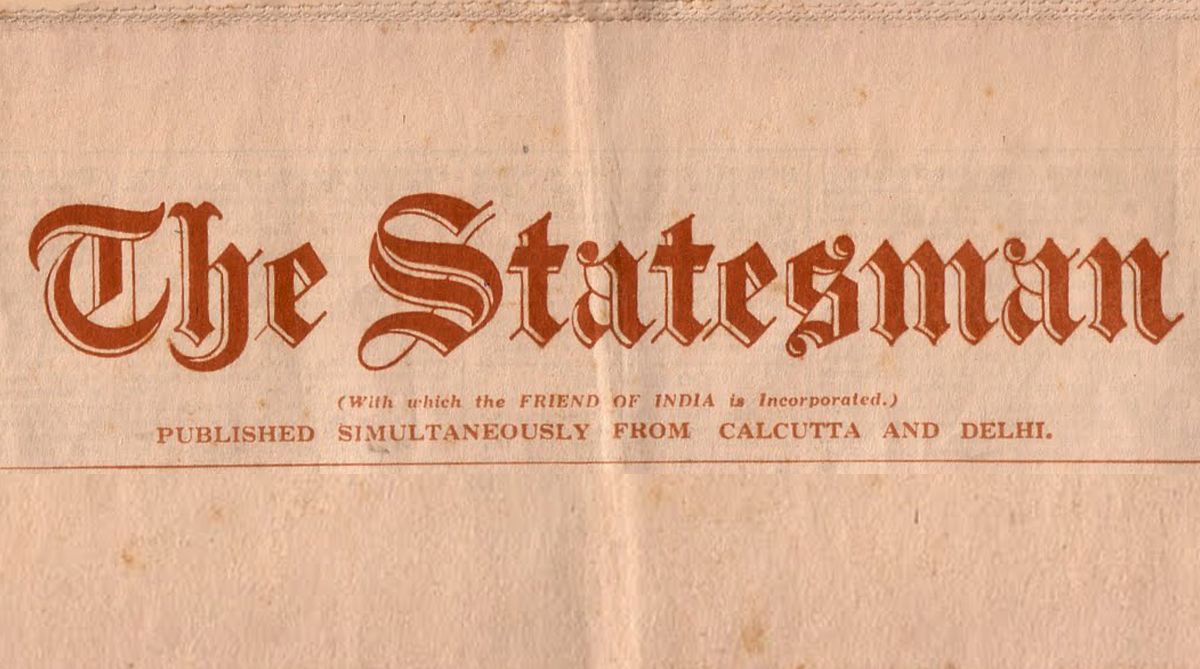A New Day, A New Dawn
There is a surprise for the readers. A special Poila Boishakh gift from none other than West Bengal chief minister Mamata Banerjee. Who has written a piece for this special edition.
On this day a century ago, these were some of the news items The Statesman readers got to read about India and the world.

OCCASIONAL NOTE
When the lay pubic finds its impressions of the monsoon, or of anything else, confirmed by expert opinion, it tastes a satisfaction which is probably not unlike that of M. Jourdain on discovering that he had been talking prose all his life.
In the same way the Indian public has held a strong impression that the monsoon conditions this year, and especially during the month of July, have not been normal.
Advertisement
It is gratifying to have this impression confirmed in the most elaborate detail by Dr. Gilbert Walker, the Director-General of Observatories, in his second monsoons forecast published yesterday.
One wonders what would have happened supposing Dr. Walker had failed to confirm the general impression, but that, after all, is superfluous. The fact remains that he has confirmed it, and this enables one to regard his predictions as to the remaining period with all the greater confidence. It would appear, then, that Dr. Walker does not now anticipate a bumper rain.
“The outlook is not favourable,” he says, summarising his conclusions, but, with a natural reluctance to depress a public which has had more than its share of distractions, military and political, during the past month or two, he considerately adds “there are grounds for expecting an improvement of the general rainfall of India.”
This forecast should satisfy everybody. It assures us of a little rain, at all events. It warns us tacitly to take what we get, and be thankful that things are no worse; and lastly it enables Dr. Walker to await developments in the assurance that he has provided for every contingency.
FATAL MOTOR CAR ACCIDENT
On Friday Mr. A.P. Peters, Deputy Magistrate of Howrah, delivered judgment in the case in which a motor car driver named Mahomedin Hossein, was charged with causing the death of a woman named Perbutty Bewa, while rashly and negligently driving his car in Golabari Road.
The Magistrate in convicting the accused and sentencing him to pay a fine of Rs 200, or in default to undergo three months’ rigorous imprisonment, observed: “It may be mentioned here that the doctrine of contributory negligence (pleaded on behalf of the accused) does not apply to criminal liability where the death of a person is caused partly by the negligence of the accused and partly by the person’s own negligence. If an accused is charged with contributing to the death of a person by his negligence, it does not matter whether the latter was deaf, or drunk, or negligent, or in part contributed to his or her own death.”
UNFORTUNATE AFFAIR AT JHELUM
A Press communiqué states: A most unfortunate incident is reported from Jhelum, in which several soldiers lost their lives and others received injuries.
It appears that owing to repeated acts of indiscipline a body of recruits attached to the depot of a unit at that station were segregated under guard in some new barracks.
When ordered to parade the recruits refused to leave their barracks and force had to be used to eject them. An armed escort was attempting to marshal the recruits with a view to their removal for trial, when the latter resisted the escort by throwing bricks and attempted to escape.
While a portion of the escort was doubling to cut off the fugitives one of the escort accidentally discharged his rifle. This was the signal for an uncontrolled outburst of firing which lasted for some twenty seconds before the officers in charge were able to stop it.
Numerous casualties resulted among the recruits and two sepoys of the escort also suffered injuries. An investigation was immediately held by the military authorities and suitable action taken to fix responsibility for this regrettable occurrence.
THE ATTACK AT DAWN
Reuter’s correspondent at the British headquarters, wiring today, says: The British heavily attacked at dawn this morning south of the Ancre to where our right rests upon the French, a distance of twelve miles.
The French shortly afterwards took up the battle and prolonged the front of attack southwards several miles. The main weight of the blow was directed against General von Hutier’s 18th Army.
The battle opened with a three minutes’ bombardment, and then a barrage of field guns and trench mortars crept forward, the heavy guns concentrating on obstinate points of resistance, while some hundreds of fighting tanks advanced as the infantry waves advanced.
The enemy was mostly taken by surprise. Our tanks crossed the river Avre, working towards more difficult ground in the Luce valley. The French also report good progress. The smartness and secrecy of our concentration was the main cause of the initial success.
Advertisement